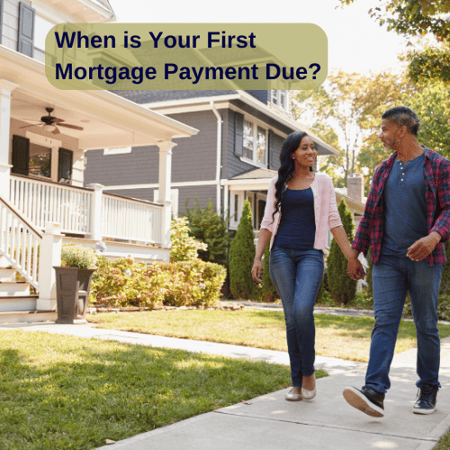Embarking on your homeownership journey is an exciting milestone, but it also introduces new responsibilities, like making your first mortgage payment.
 It seems simple enough, but like anything else, you don't know what you don't know. Understanding when and how to manage this payment can ease a first-time home buyer's transition into homeownership.
It seems simple enough, but like anything else, you don't know what you don't know. Understanding when and how to manage this payment can ease a first-time home buyer's transition into homeownership.
Here's a straightforward, short guide to help you navigate your first mortgage payment.
When is Your First Mortgage Payment Due?
The timing of your first mortgage payment is linked to your closing date and generally falls more than 30 days after the closing. You can determine when it's due by adding a month to your closing date; the payment typically is expected on the first day of the following month. For example, if you close on March 8, your first payment will be due May 1.
This schedule might seem like you're skipping a month, but your mortgage payments, unlike rent payments, cover the previous month's occupancy, not the current one.
Understanding Your Mortgage Payment
Your first and subsequent mortgage payments include principal, interest, taxes, and insurance (PITI), which make your total monthly payment. If your down payment was less than 20 percent, you will likely also be paying mortgage insurance (MI), sometimes called private mortgage insurance (PMI).
At the beginning of your loan term, most of your payment will go towards paying off the interest on the loan, meaning only a tiny portion of your payment will go towards paying down the principal amount you borrowed. If you make additional principal payments over your loan term, you can significantly reduce the interest you will pay over time.
It's important to review your closing disclosure document carefully before signing on the dotted line. This document provides a detailed breakdown of your payment amount, including how much of it is going towards the principal and how much is going towards interest. By understanding the breakdown of your payments, you can better prepare yourself financially.
Preparing for Your First Payment
During closing and relocating, managing your initial mortgage payment for your new home strains your finances. To alleviate this, the following are some strategies to employ before the due date of your first mortgage payment:
- Strategic Closing Date: You can try to align your closing with the end of your rental lease to avoid overlapping payments. Of course, this is only sometimes possible.
- Cut Back on Non-Essentials: You should reduce discretionary spending to prioritize your mortgage payment.
- Plan to Replenish Savings: After using savings for your home purchase, strategize to rebuild your financial cushion. An emergency fund covering at least three months of your monthly expenses is critical. Saving for six months of expenses is better.
Making Your First Mortgage Payment
You have several options to make your mortgage payment:
- Auto-Pay: Using your bank's or your lender's auto-pay platform efficiently ensures timely payments, helping you avoid late fees and maintain your credit score.
- Online: Utilize your lender's portal for convenient payments. Many professionals do not recommend authorizing your lender to withdraw your monthly mortgage payment from your bank account automatically.
- By Mail: Send your payment via check or money order, ensuring it arrives before the due date. Always include your mortgage account number on your check.
- By Phone: You might be able to pay by phone if you're nearing the payment deadline but verify any applicable service charges. It's unlikely you will ever pay by phone.
What if You Miss a Payment?
If you miss a payment, address it promptly to avoid affecting your credit. Lenders typically offer a grace period of 15 to 30 days, and if you make a payment during that time, you are less likely to incur a penalty or late fee charge.
Communicate with your lender if you anticipate difficulties making timely payments. They may offer solutions like a loan modification or a temporary payment reduction.






